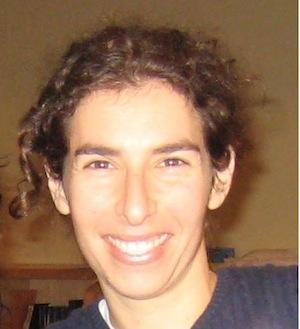
The Kulanu advertisement that ran in the Toronto Star that Rabbi Kaplan found offensive to Jews. Credit: Joe Levin from (privateinvesigations.blogspot.com)

Justine Apple, executive director of Kulanu Toronto, an advocacy group for lesbian, gay, bisexual and transgender Jews. Credit: Justine Apple
York Regional Police (YRP) inspectors have wrapped up an internal investigation of their in-house rabbi, launched in response to a complaint about a “very homophobic” sermon.
The “letter of concern” was filed by Kulanu Toronto, an advocacy group for lesbian, gay, bisexual and transgender Jews, against Rabbi Mendel Kaplan, the Jewish chaplain for YRP. In his sermon, given just before Toronto Pride 2010, Kaplan instructed his followers to not support Kulanu or the Pride parade, referring to gays as “an abomination,” says Justine Apple, executive director of Kulanu.
The police conclusion suggests that homophobia is okay so long as it’s framed within the context of religious scripture.
“After reviewing his case it was concluded that his statements were technically a correct interpretation of religious scripture because they were put in context of a religious text. So his words had clout and were deemed not homophobic, and his comments were not viewed as hateful,” Apple says.
Ricky Veerappan, an inspector in the diversity and cultural research bureau of YRP, says police could not substantiate the allegations of hate rhetoric.
“We looked at it from a purely religious perspective,” he says. “Experts agreed that the content was technically correct. I’m in no position to judge if that’s hateful.”
Although she wasn’t there to hear the sermon firsthand, Apple says reliable sources summarized Kaplan’s words for her. “[Kaplan] said, ‘This is ridiculous. We don’t want you marching with the Kulanu community. How can you even consider it? It’s against the Torah. It’s against the Bible.’
“People even walked out of the synagogue because they were disgusted by what he said about the gay community,” she tells Xtra. “They got up in the middle and walked out.”
Kaplan gave his sermon after Kulanu published a full-page advertisement in the Toronto Star just before the 2010 Pride parade. “The rabbi got a hold of the ad and presented it to his synagogue members while he spoke.
“The ad was a call-out to people to come and march with us because of the whole QuAIA [Queers Against Israeli Apartheid] controversy, so we wanted community support,” she says. But Kaplan used that advertisement to blast the gay community.
Kaplan tells Xtra he stands by his comments. “I took exception to [homosexuality] and I continue to take exception to it.”
Kaplan says he feels Kulanu was “100 percent” off base for filing a complaint in the first place. “Kulanu filed the complaint because of things they heard that I said without ever bothering to pick up a phone and ask if it is true of not.”
Asked if he regrets saying gays are an “abomination,” he repeats, “I believe the Torah’s teachings are eternal. The Torah’s position is very clear. You’re welcome to study the Torah yourself… I was attacked. Kulanu asked that I be removed from the chaplaincy.”
YRP started looking into the matter in August. Over five months, police interviewed about 25 people, including religious leaders, gay and lesbian community members, the provincial Crown’s office, theologians and other “subject-matter experts,” Apple says.
The police review also examined an email Kaplan sent to Bernie Farber, chief executive officer of the Canadian Jewish Congress, in response to an email Farber sent to about 10 rabbis in July about Toronto Pride. Kaplan was the only one to reply, and he did so by responding to each of Farber’s points “line by line,” Farber says.
In the email, Kaplan comments on the Pride parade, QuAIA and homosexuality, as interpreted by the Torah. Kaplan says to Farber, “You shamefully called upon the community to participate in the celebration of what our Holy Torah makes a point of calling To’eva,” which translates as “abomination.”
Xtra has included the full text of the email below.
From an orthodox perspective, Farber says, Kaplan, who “is wearing his rabbinical hat,” is correct in calling gays “an abomination.” Many religious people take the view “hate the sin, love the sinner,” he says.
“This is how homosexuality was referred to [in holy books],” he says. “As a rabbi he is entitled to have that interpretation. You may not like it, and I may not agree with it, but [that interpretation] is protected by law.
“Often chaplains hold very strong views, but when they operate it’s often a Don’t Ask, Don’t Tell situation. They don’t often make their strong views public.”
Farber understands that he always speaks as a public official, and he is careful with what he says because of that. “If I say something publicly, whether I like it or not, that hat is on my head. So I must always be careful.” Kaplan is no different, he says.
Like Apple, Farber questions whether Kaplan is the most appropriate choice to represent YRP. “That’s what has to be answered.”
“It’s not enough to say, ‘It’s in the Bible and that makes it OK,’ even if that may be true,” Farber says. “Does it make it right to take it one step further and take that position as a public official? That’s a serious question that deserves a thoughtful answer, and we have not heard that yet.”
Veerappan says the police investigation concluded in January with the decision that Kaplan would remain a police chaplain.
“It was a lengthy process and we wanted to be sure we covered as many bases as possible. We went through the email word by word,” he says.
Kaplan and Farber were speaking “on two different wavelengths,” he says. “Kaplan was speaking from a purely religious and spiritual perspective.
“The tone in the email may have been, um, passionate, but the content is [accurate].”
The gay, lesbian and trans community members who reviewed the email said “they may not agree with it, but they understand it’s a religious interpretation,” Veerappan tells Xtra.
In her complaint, Apple asked that Kaplan be removed from his position with YRP. She still feels Kaplan does not reflect the mandate of York police or the York community.
“This is a man who represents York Regional Police,” Apple says. “He is supposed to uphold the mandate of York Regional Police, which is inclusivity, equality, kindness, tolerance, acceptance.”
Kaplan is one of eight York police chaplains, each representing different religions and denominations, Veerappan says.
“The chaplain serves the community by offering guidance and by being a resource to police,” he says. “We have a very diverse community in York region. We are not the experts in these matters.”
When asked if he feels he should apologize to the gay and lesbian community for his comments, which many consider to be highly offensive, Kaplan says, “Why should there be an apology? An apology for what? I don’t know what you want me to say. I believe the Torah is divinely inspired, along with millions of other Jews around the world.”
Veerappan admits the gay and lesbian community seems to consistently clash with religion on issues of basic equality rights.
“I learned a lot from this process,” he says. “In many areas the LGBT community and religion seem not to see eye to eye, and that’s fine. From our perspective we are talking about human rights, someone’s rights being violated.”

 Why you can trust Xtra
Why you can trust Xtra


